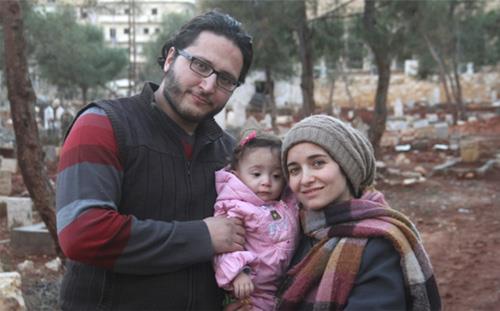
Sama al-Kateab doesn't know it yet, but she's got one of the world's most riveting and sobering baby books.
It's a full-length film, titled For Sama, and premiering Tuesday at 10 p.m. ET in the PBS Frontline series (check local listings).
Like most baby books, For Sama was put together by Sama's mother, who, in this case, is Waad al-Kateab.
The film covers the five years Waad and her husband Hamza lived and worked in Aleppo, Syria, as sympathizers with the rebel force that took over part of the city and briefly dared to dream it could eventually wrestle all of Syria away from President Bashar al-Assad.
While Syria remains in turmoil, that particular band of rebels eventually was driven from their newly won turf by al-Assad's forces, with the help of Russian warplanes that turned most of that city into rubble.
Waad came to Aleppo as a teenager to study economics at Aleppo University. The uprising began in her fourth year, powered largely by activist students protesting what they saw as widespread corruption and injustice under the al-Assad regime.
Waad joined the rebellion, hoping to help those oppressed by al-Assad. She began filming life around Aleppo, including her own, and she became a citizen journalist, sending out dispatches that detailed life in a time of war.
A frequent subject in her reports was Hamza al-Kateab, a doctor at a local hospital and an activist himself.
They fell in love and married. Shortly thereafter, Waad became pregnant with Sama, who was born into a world where the sound of exploding artillery shells was more common than the chirping of birds.
A number of segments in For Sama look as if the camera operator has been grabbed and tossed aside. They're choppy, jerky, out of focus. A shot of a person becomes a shot of the sky or the ground. Background voices become more urgent and more indistinct.
This is deliberate. Al-Kateab wants to convey the chaos and terror of living in a place where nothing and no one is safe or immune.
When most of the apartments are struck by bombs from warplanes, she and Sama move into a small makeshift room in the hospital. The walls all have sandbags to protect against shrapnel from exploding shells.
Eventually, that is not enough. As regime troops slowly take back the rebel-held part of the city, airstrikes destroy eight of its nine hospitals.
For Sama repeatedly captures scenes of families and victims pouring into the remaining hospital, or sometimes being carried in. We see the dead separated from the living. Mothers come in and scoop up the covered bodies of their dead children, cradling them as they walk home for burial. The corridors, floors, and fixtures of the hospital are slippery with blood.
None of this is a secret. Waad notes that her dispatches are widely read. Hamza often goes on news shows via Skype to talk about what is happening. They report how regime troops slaughter civilians attempting to flee. They show children trying to escape chlorine gas, an indiscriminate killer.
And yet, Waad tells the camera, no one seems able to come in and help. The rebels, once full of hope, are gradually squeezed back to nothing.
As all this unfolds, over several years, Waad tells the camera she is making this film mostly because she wants Sama one day to have this record of what was happening with her parents when she was too young to understand or remember.
She wants Sama to know they fought for something they considered right and good, even if this time they did not win, and even though it left all of them in constant danger.
The film thus becomes its own statement of hope and defiance, and the same can be said for Sama herself, whom we see often and who is an extraordinarily cute kid.
If For Sama has a deeply personal underpinning, it also serves as a good primer for American audiences on the Syrian conflict. It comes from one perspective, of course, but it lays out the players and the conflicts in an understandable way, something that often gets lost in the widespread perception that the whole situation is an indecipherable carnival of horrors.
The al-Kateabs now live in London. The lingering question for them, it might be fair to surmise, is whether Sama will one day watch her film and be able to say the land of her birth has risen above these worst possible moments.